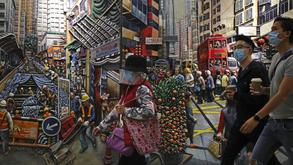 People wearing face masks to protect themselves from possibly contracting the coronavirus walk past a painting in Hong Kong, April 25, 2020. (KIN CHEUNG / AP)
People wearing face masks to protect themselves from possibly contracting the coronavirus walk past a painting in Hong Kong, April 25, 2020. (KIN CHEUNG / AP)
The chairman of Hong Kong’s Hospital Authority (HA), Henry Fan Hung-ling, has suggested that authorities lift the order to temporarily shut establishments such as beauty and massage parlors, game centers and pubs, as confirmed cases in the city have been on the decline.
The Hospital Authority head praised the SAR government’s response measures to COVID-19 as “timely and effective”, saying it managed to strike a balance between fighting the coronavirus and protecting the economy and people’s livelihoods. But he also said the city has paid a heavy price in the fight
It’s time to consider relaxing control measures against the transmission of COVID-19, Fan said in an interview with China Daily on Monday.
But he added that restrictions on the number of customers and social-distancing measures, like wearing masks and keeping a distance of 1.5 meters between tables, should remain in force.
Hong Kong reported no new COVID-19 cases on Tuesday, the third day in a row and the fifth time since April 20.
Chief Executive Carrie Lam Cheng Yuet-ngor announced on Tuesday that most government employees should return to work at their offices by Monday. Outdoor sports grounds, libraries, and museums will reopen starting from Monday.
Current social-distancing measures, including the ban on gatherings of more than four people, will stay in place until May 7.
“The control measures should not become permanent. Otherwise, our economy will suffer and people will become tired of fighting the virus, with countless businesses closing and many people losing their jobs,” Fan said.
While suggesting the government relax these measures step by step, Fan warned that the city must not be complacent. Hong Kong has an externally oriented economy, which will be vulnerable to further waves of virus infections when normal passenger flows and international flights resume, he said.
He cited the second wave resulting from the return of a huge number of students and tourists before March 19. He also noted that Singapore, praised for doing quite well initially in fighting the virus, saw a sudden upsurge in confirmed cases due to a community outbreak.
“We don’t know how much longer COVID-19 will remain”, he said. “But many experts have said it is possible the coronavirus may stay permanently, and people must be prepared to live with the coronavirus forever. Although it may become weaker in summer, it won’t disappear, and we must wait for a suitable vaccine to cure this coronavirus,” Fan added.
The Hospital Authority head praised the SAR government’s response measures to COVID-19 as “timely and effective”, saying it managed to strike a balance between fighting the coronavirus and protecting the economy and people’s livelihoods. But he also said the city has paid a heavy price in the fight.
He cited as an example the slump in the number of passengers handled by Hong Kong, a world-renowned aviation hub. Hong Kong International Airport received around 75 million passengers in 2019. But now, daily passenger flow is between 2,000 and 3,000.
In response to criticism that virus-control measures hurt human freedoms, he said the decisions made by the chief executive-led steering committee and the experts were reasonable and fair.
Hong Kong has not imposed the most stringent measures, compared with lockdowns in many countries; but it has not been the most lenient place either, Fan said.
Control measures always hurt the economy, people’s livelihoods and civil liberties; they were difficult decisions but were made to save lives, he explained.
Control measures in the United States and the United Kingdom were rather slack initially, which resulted in steep rises in confirmed cases and deaths, he noted. These countries did not take bold steps like China, which was very decisive in locking down the city of Wuhan and much of Hubei province.


